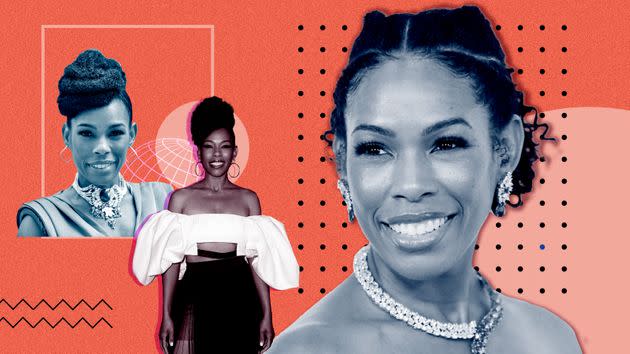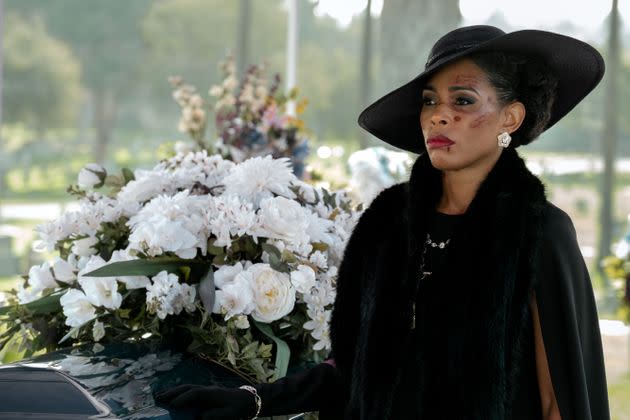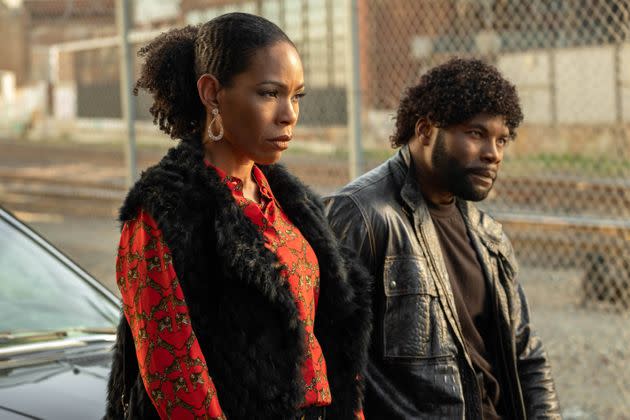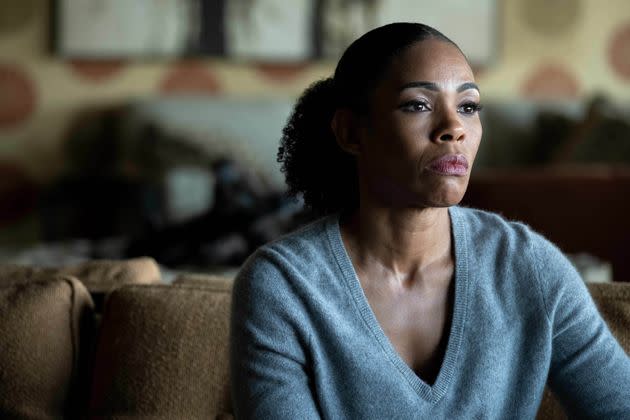‘Snowfall’ Actor Angela Lewis On Why Aunt Louie Is Right To Blame Franklin

I Run This
AngelaLewisis protective of Aunt Louie.
She said her “Snowfall” character is the reason her nephew and main protagonist Franklin Saint (Damson Idris), was able to build his drug empire “brick by brick” in the first place on the hit FX show. Despite that, Lewis told HuffPost that Louie had been undervalued for far too long to do nothing.
In the show’s final season, Louie and Franklin are at war as Franklin is on the hunt for his stolen $73 million, and Louie is working to secure her position at the top. Unfortunately, the war’s bloodshed has gotten closer and closer to home, and in Episode 6, it reaches Louie’s doorstep when she gets abducted and tortured. Franklin tips off Louie’s husband, Uncle Jerome (Amin Joseph), and he comes to her rescue. While Jerome saves Louie, he doesn’t make it out alive himself.
It was one of the most devastating deaths of the entire series. Now, with a vengeful heart and two paths to take, Louie must decide whether she will help Franklin kill Teddy (Carter Hudson), the ex-CIA agent who brought crack into 1980s South Central Los Angeles in the first place.
“Snowfall” fans haven’t let up on Louie, many of them feel she double-crossed Franklin and blame her for Jerome’s death. Lewis, however, wants to straighten a few facts on Louie’s behalf.
“Louie is a person who came from nothing and was able to see opportunity and take that opportunity and create more opportunity for herself and for her family. And she’s a woman who experienced an awakening and self-actualized,” Lewis said. “She was able to find her worth and fight for her right to exist in a space that is not normally occupied by women. And when we leave Louie, she is fighting for her autonomy.”
For “I Run This,” Lewis breaks down the biggest misconception about Aunt Louie, where her character goes after the death of Uncle Jerome, and the message she would give “Snowfall” creator and late film icon John Singleton.

Angela Lewis wants you to know Aunt Louie is justified in her actions.
How does it feel wrapping this final season of “Snowfall”?
Listen, six amazing, beautiful, love-filled seasons with a cast and a crew is unheard of and rare and a beautiful thing to be a part of. So I’m definitely going to miss everybody, and I think most of us will stay in contact and see each other every now and again, but it will be nothing like it has been for the past six, seven years. I’m definitely going to miss that, and I think I’m still grieving a little bit over the loss of that extended family.
But I think we all brought our A games, and we all worked really hard, and we all supported each other and created a beautiful thing that has a lasting impact and will have a lasting impact. So I’m really proud of that, and I’m really excited to see what’s next for everybody.
Contrary to whatever folks may say, there is no “Snowfall” without Aunt Louie. She was literally the original connector of dots for Franklin. And I think not only the characters in this world forget that, but also the fan base may forget that, which leads to this season of self-actualization that Louie has been having. However, we see ego taking over. As the actor playing Louie, can you walk us through a little bit of her psyche in how we got here?
At the beginning, Franklin had 24 hours to get this key off. He never would’ve got that down without Louie. And then Louie tried to say, “Hey, listen, this is not a good thing.” But when she saw that Franklin wasn’t going to walk away, that he was going to do this, I think she also saw the opportunity that he had. And she convinced Jerome. Louie is opportunistic. That’s how she’s able to be a survivor. She comes from nothing and has amazing vision. She always has. But she didn’t have the opportunity to express that.
Franklin taught her how to cook. That started out Louie and Franklin, and then Franklin had to go and be the boss and do the thing. So that left Louie in the kitchen, and she did that for a long time, even though she was still a big part of his strategizing and figuring out how to expand this business. She was being undervalued by Franklin, and she was being undervalued by Jerome. And she walked away, and she went back to Claudia and turned her club around and made it more successful than it was. And Franklin came back to Louie twice at Claudia’s and asked her to come back. And Louie said, “No.” Jerome was falling apart; the business was falling apart. Franklin needed his right hand.
Finally, Louie and Claudia got into it, and she sought refuge in Jerome, and then Jerome apologized and said, “Listen, I hear you. I see you. I’m ready to make you an equal partner in our relationship.” And that’s why Louie came back, and she was able to help Franklin get things back on track. When Louie was shot and almost killed, then called the truce between Skully and the Saint family on her deathbed. I think while she was on that hospital bed, she had a lot of time to think and reassess.
Franklin even says Louie brings in 90% of his profits. So she had to learn her worth and realize that she was not being valued. She wasn’t being heard. She wasn’t given the opportunity to do all the things that she knew she could do within the context of their business. And so when you’ve been shot and almost killed, you reassess. And she’s like, no, I think I can do this on my own.
The last two episodes we watched are really heavy. How did you feel when you first read the script and found out that Jerome died saving Louie’s life?
Yeah, that was hard. It was hard to read. It was hard to shoot. It was hard to deal with afterward. Hard for Louie, hard for Angela. When you have been partners with somebody for so long, and they play such a significant part, not only in your story but also in how you tell the story, it hurts. We knew everybody wasn’t going to make it out of this story alive. And how many of us are going to die? We don’t know. We didn’t know. So there’s always, you know, the risk, you know, the fear with every script. But to lose him, the actuality of it, was really quite devastating.
Can you walk me through what it was like on set that day, filming his final scene?
By the time we got to Jerome’s final scene, Louie had gone through a lot, being tortured. And a lot was cut out from the episode to soften the trauma of our experience watching the show. But we still shot a lot. Louie is tortured, and they’re trying to break her spirit. That’s a whole other level of torture and exhausting, and still holding on to some kind of hope that she’s going to get out of this. So by the time Jerome comes, there is an exuberance that he found her. And then I think Louie fully believes that they’re going to make it out until the very end ― until Jerome is gone. And so she’s shattered. Every ounce of her is shattered. And I think she left a part of herself there on that floor. It was hard.

Angela Lewis as Aunt Louie, Amin Joseph as Jerome Saint.
And in those two episodes, I can only imagine how heavy it was for you as an actor to go from these gruesome torture scenes to filming your final scene with someone you’ve been opposite for six seasons. And we see Louie in Episode 7 coming to terms with the fact that Jerome is gone and that she is vengeful at that point. What did you channel to find the mental fortitude for those two episodes?
I started my days with meditation, a covering of white light all over my energetic self. And then I invited Louie into my space. Music played a big part in helping me to create and develop a deeper backstory for Jerome, which then allowed me to grieve deeper for his loss. And then there was the interesting thing of reality, life imitating art, where it was surreal to not have Amin there on set with me.
In Episode 7, we shot in their home. They went and bought this really fancy house, but we’d never seen them in that house before. And the first time I went in that house, it was like, “Oh man, but Amin’s not here.” And it was just kind of weird and crazy.
One of the days, we had a double-up day, which meant we had two crews ’cause we were shooting two different episodes. And so I was on with a crew that was unfamiliar to me. And normally, when that happens, Amin is there, so I know somebody, but this day, Amin wasn’t there. And that was very lonely and sad and a little bit scary. Amin is not there, so Jerome is not there. And so it just made Louie that much more mad and that much more scared to not have anybody. It intensified everything. So I had to lean into all the things that I was organically feeling and know that Louie was feeling those things too.
Do you think Louie is justified in blaming Franklin for not only the death of Jerome but also just some of the fallout that’s happened recently?
Absolutely. Franklin snitched and told Kane that she put the head out on him; Franklin snitched and told Kane where Louie was going to be, where they grabbed her. If it hadn’t been for those two things that Franklin did, Louie would not have been in that situation, and Kane would still be looking for her. Those were direct links to what happened.
So many people are pointing the finger at Louie and saying, “Well, Louie went behind Franklin’s back in the first place.” How does it feel when you look online and kind of see all of this hatred overwhelmingly so directed toward Louie?
It’s intense and crazy and funny. And I don’t care that people hate Louie or are mad at her. What gets me is why they’re mad. They’re mad because Louie went behind Franklin’s back, and I don’t look at it like that. I looked at it as she went over his head. But that was after she was shot and almost killed and bleeding out, and then called the truce from her deathbed and realized who she was and her value.
And if you are in a business and your boss is getting the best product from this particular supplier, and then you go off on your own, why would you go to a lesser supplier? No, you would go to the best. It happens in business all the time, be it an illegal business or a legal business, it happens all the time. Do you tell your boss that you’re going to do that? No. You go over their head, and you make your move, and then the supplier can say, “Yay or nay.” This supplier said, “Yay, let’s work together.”
Franklin got mad, and Franklin had other plans. Franklin was going to go off and be husband and daddy and do real estate. That was the plan. And then Teddy stole his money. Louie had nothing to do with Teddy stealing his money.
What do you think is the biggest misconception that people have about Aunt Louie?
There are so many. The biggest one is that this is all Louie’s fault. And that’s just not true. There’s a culmination of poor decisions by Franklin. They’re mad that they’re saying Kane coming after them is Louie’s fault. And that’s not true. Kane was already coming after them because Franklin shot and killed Kane’s brother, Kevin. That’s why Kane came after them in the first place. And Louie was almost shot again in that shootout that Kane’s people did. And so she went after Kane.
Now you can argue all day whether or not Franklin and Leon told her not to do it. You can argue if she made a good choice or a bad choice, but who wouldn’t in this game that we are playing? Who wouldn’t seek revenge on the person that tried to kill you? And she says that to Leon. She says it very clearly. And so Kane would still be trying to figure out who was after him if Franklin hadn’t gotten mad at Louie and told him. So no, I don’t think this whole thing is Louie’s fault.
We’re all waiting to see what happens now that Jerome is dead, and when his funeral passes, Louie has a tough decision to make. What pros does Louie have for helping Franklin kill Teddy and vice versa?
Well, I think they’re both people that Louie would like to see eliminated. So I think for Louie, it’s just a matter of strategy. Who needs to come off the playing field first?
And then also, Jerome is gone, and so she’s reassessing everything. Is it even worth it? Is she going to just walk away and not side with Franklin or Teddy? What are the chances that she’ll make it out of this alive? So there’s that part, too.

Lewis says Louie feeling undervalued led to her moment of self-actualization.
What was the most memorable scene you filmed this season?
It would have to be a toss-up between the junkyard scene. All of Episode 7 was pretty memorable. Her journey in the wake of Jerome’s passing was pretty memorable. I haven’t seen the final episode yet, so I only know what we shot, not what made it to the screen, but we put a lot of effort into exploring the deep compacting of her trauma and grief. And how do women who have experienced abuse and trauma begin their journey of healing, or at least of decompression? What does that look like?
For me, it was important for it not to look like just strictly sorrow and crying and talking about, “It hurt, it felt like this,” because I don’t think that that is the reality. I think there are many ways that we deal with our trauma and that we either talk about it or not talk about it and how we talk about it, and who we talk about it with. And we were very specific about who Louie opened up to and how she opened up. And so, I am glad that we at least had that discussion, and I hope that what we shot made it to the screen.
One thing that I love is that Louie has worn her natural hair through these six seasons. What has that meant for you as an actor?
Yeah, it was important to me, too. We’ve already been in the fight to be seen as beautiful and sexy and smart and capable in our own skin, and that means in our own hair. And I just think that it’s important to keep fighting for that. It’s important to keep understanding that we can be a variety of things, and each of those can be seen as beautiful, can be seen as elegant, can be seen as this is just a part of us. And why can’t that be equally appreciated?
What other roles do you hope to play in the future, whether in front of the camera or behind?
Yeah, so I have a production company with my husband and some co-producers, and that’s a new hat for me, but I’m really, really excited. And we have a whole slate of projects that we are shopping around and developing, and so I’m excited to dive more into that.
I also have a nonprofit called Birth Village, where we are raising awareness and funds, and access to resources for Black mothers and mothers of color and their families to eradicate the Black maternal health crisis. And so I’m excited to dive more into that and keep spreading the word and keep raising money and make it so that Black mothers and mothers of color and their babies and their families can experience the joys of birth.
What message would you have for “Snowfall” creator John Singleton today?
I would just tell him, thank you for the impact that he had on my life personally and then for the impact that he’s had on the world because that’s the ripple of the impact that he had on other individuals in their lives, therefore on our community and our community of Black people, our community as film and television-goers, the Hollywood community, the artistic community, the community of our nation, and then the globe.
He fought very, very hard for equity and change and people. When people that I didn’t necessarily know step into the forefront and talk about how John changed their lives, it just sends shivers through me and makes me want to be the same kind of person that can see somebody and see everybody as important and everybody as fully capable, if they want to be.
If you can do this job, the job is yours. How amazing is that? And to have the vision that he had is really incredible. So I would just tell him, “Thank you.” And I would just let him know that I’m still... I’m being more Detroit.
